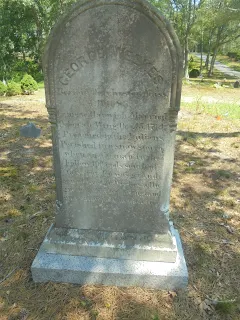I've been getting my exercise by riding my bicycle along the Cape Cod Rail Trail and usually do about 10 or 12 miles per day. Along the way I take pictures of various historical landmarks found almost all over Cape Cod. One of the areas I find most interesting is the old cemeteries where some of the earliest settlers were laid to rest. One such cemetery in Harwich has some the oldest gravestones in the country. I was impressed by the inscriptions that, although quite weather beaten, could still be read. One such stone indicated that the person buried there fought along side General Washington in the Revolutionary War (I'll probably write something about that one at a later date.) The other day I met a widow who was reading a book by her husband's gravesite (A Korean War veteran). The woman told me of another historical gravestone not far from where she was sitting that had a unique inscription. Today I went back to that final resting place of so many historical characters to find the one she described. They're not as well known as George Washington was but they are truly a part of America's past as anyone could be. George Weekes was one unique character, he died just 1,650 feet from his final resting place...only the inscription reads 100 rods. ~ Norman E. Hooben
The following narrative comes from RootsWeb.com
George Weekes had lived in Boston, but in 1714 removed to Harwich. He was dismissed from the Old South Church in Boston March 27, 1720, and joined the church at Harwich (north side) under the care of Rev. Nathaniel Stone. He afterwards removed to the south part of the town, where many of his descendants now live, and where he carried on a farm. George Weekes was not "liberally" educated, but was well versed in the theological books of the day, and was familiar with the scriptures. In 1730, though not ordained by human hands, he commenced preaching to the Indians, who were located toward the south and far removed from the meeting house, which was on the north side of the parish of 23 square miles. Mr. Weekes built a house of worship for the Indians at his own expense. Notwithstanding these facts, the pastor, Mr. Stone, objected, but does not appear to have insisted on a discontinuance. Learning, however, the Mr. Weekes on one or more occasions preached to some of his white neighbors, who, no doubt, were glad to assemble occasionally on a weekday or stormy Sunday for religious instruction and conference, being as they were so far removed from their regular place of worship. Mr. Stone vigorously protested and complained to the church in regard to the matter. His grounds of complaint were that Mr. Weekes had "no more if so much as an early common education," that he "had thrust himself into the meeting," that he "had preached to a people of whom I have the pastoral charge, without my leave and against my declared mind." There does not appear to have been any charge of want of orthodoxy. Some years later, Mr. Weekes seems to have taken pity upon an unfortunate woman and taken her with her child into his house. Some took offense at this and would not come to the Lord's table with him, in view of which state of feeling he absented himself from the communion. On being called to account for his absence, he made explanations which were accepted by the church as in a measure satisfactory, but at the same time he was advised to dismiss the woman from his house and to avoid "her conversations as much as convenient. "There seems to have been no charge against him of impropriety. [CI:1236:?4:CI]
In the later years of his life, his mind was clouded, which led to aimless wanderings about the country. He died from exposure to the cold in the low ground south of Harwich Academy, known from the circumstance as "Weekes' Hollow" to the present day -- being more than 80 years old.[CI:1235:?4:CI]
A short distance beyond the new cemetery in Harwich, in an open field where there are a few ancient graves, is one with this inscription: "George Weekes, born in Dorchester, Mass., A.D. 1683, came to Harwich, married Deborah Wing Oct. 15, 1714, preached to the Indians, and perished in a snow storm in the hollow one hundred rods south of this spot. he was a grandson of George Weekes, a Huegenot, who fled to England, and came to America in 1630."[CI:242:?4:CI]


No comments:
Post a Comment